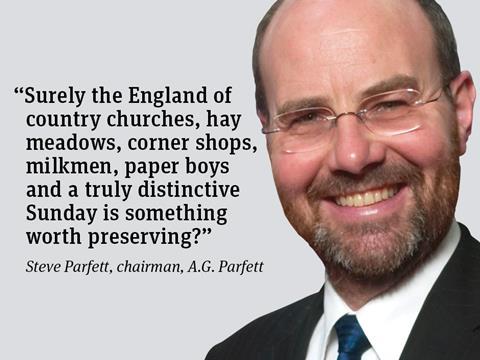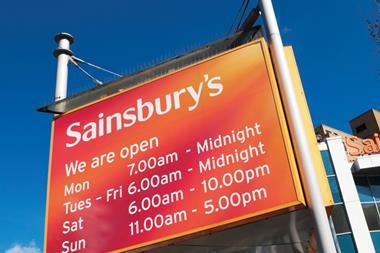
Sunday trading is an iconic issue for the independent sector, and one of huge importance. The six-hour compromise whereby large stores are only allowed to trade for six hours was pragmatic and has served the market well, allowing all sides to maintain a balanced position.
This is now threatened in a very significant and poorly thought through way, with neither evidence of benefit nor a real groundswell of opinion. Surveys show a vast majority of the public favour the current and workable compromise and even the large stores are divided in their opinions, with Sainsbury’s and Tesco ambivalent at best.
We are a society with a heritage based on Christian values and despite declining church attendance this informs our cultural heritage. Sunday has always been a different day and that feeling of difference is surely something to relish rather than discard, particularly as it is a vital but intangible aspect of our tourism industry. In changing it there is no going back and we face a monotony of misery, where every day feels the same, matching the identikit high streets.
In addition, the evidence of any commercial benefit is riddled with errors, even when presented to its best advantage. The relaxation in 2012 led to a decline in year-on-year sales when measured properly, and the government justification is from a flawed and out-of-date analysis from 2006. A much more plausible argument can be made that trade would just be spread over more hours while costs rise.
Perhaps most crucially of all, the proposal itself is muddled in proposing devolution of decision-making to local authorities, with all the potential for a postcode lottery on opening, shops adjacent to each other subject to different regulation, and customer confusion and dissatisfaction.
The cheerleaders for the proposal in our sector are Asda and Morrisons – is it a coincidence that these are the two players whose strategic vision failed them miserably in convenience and who are now playing catch-up very badly? There is genuine merit in a reasoned argument that the present compromise is the best way of balancing society’s need to shop with a cultural heritage that recognises traditional and cherished factors that do not pander to the charge toward globalisation, consumerism and bland uniformity.
I hesitate to sound like John Major but surely the England of country churches, hay meadows, corner shops, milkmen, paper boys, the sound of willow striking leather and a truly distinctive Sunday is worth preserving.
This is a badly thought through proposal that will not achieve its supposed benefits. It should be scrapped.



















No comments yet